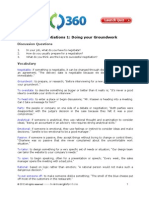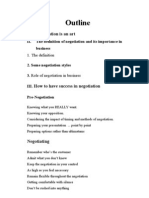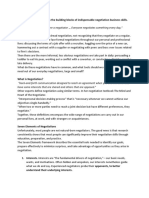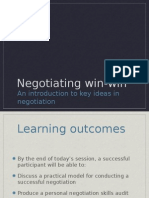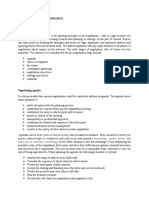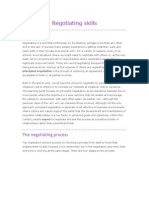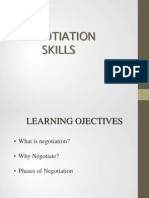Business Matters
Preparing for
a Negotiation
Table of Contents
2 Warm-Up
3 Vocabulary Preview
4 Reading
5 Comprehension
$?
5 Vocabulary Review
6 Practice
7 Discussion
$$
7 Challenge
8 Answer Key
Copyright 2020, Red River Press Inc. For use by ESL Library members only. (H I G H I N T / V E R S I O N 2 . 0) 1
� Preparing for a Negotiation
Business Matters
Warm-Up
THE BID
A. Activity B. Discussion
How to Play Come together as a class and talk about what
happened in the game.
Get into groups of five or fewer. Shuffle the cards and
take five cards from the top without looking at them.
1. Were bids different in the first round and the
Choose a first player. That player flips over one card
fifth round?
and all players take turns bidding on it using their 20
tokens. Each card has a point value according to the 2. Did anyone get zero points? If so, why?
chart below.
3. If you had known what cards would come, could
How to Bid you have had a better bid?
The first player will say any number from 1 to 20—this 4. How would the game have been if you didn’t know
is the first bid. Then go around the table. During each each card’s point value?
player’s turn, he or she can bid a higher number or
5. What can you learn about the value of information
pass. When there are no more bids, the player who
in a negotiation?
bid the most spends the tokens equal to the bid and
takes the card. Move to the next player and repeat,
bidding on each card one by one without taking any
new tokens.
How to Win
The winner is the player with the most points at the
end of five rounds of bidding. Leftover tokens are
worth zero points.
Scoring
Card Points
2–10 2–10
J 11
Q 12
K 13
A 14
Copyright 2020, Red River Press Inc. For use by ESL Library members only. (H I G H I N T / V E R S I O N 2 . 0) 2
� Preparing for a Negotiation
Business Matters
Vocabulary Preview
Match as many vocabulary words to their meanings as you can.
After reading the article on page 4, check this exercise again.
1. critical a) to make a good thing happen
2. party b) about money, using money
3. outcome c) what you have at the end
4. main objective d) a person or group at a meeting
5. secondary factor e) a different option or possibility
6. monetary f) a second thing to consider
7. alternative g) changing, able to change
8. minimum h) the most important thing you want
9. achieve i) the smallest number or amount
10. flexible j) highly important
Copyright 2020, Red River Press Inc. For use by ESL Library members only. (H I G H I N T / V E R S I O N 2 . 0) 3
� Preparing for a Negotiation
Business Matters
Reading
HOW TO NEGOTIATE
1. Everyone negotiates. Deciding how to split a 4. Next, you will calculate your best alternative to a
restaurant bill with friends is a negotiation. negotiated agreement (BATNA). What will happen if
Choosing what housework family members do at you and the other party can’t agree? Be as specific
home is a negotiation. In some parts of the world, as possible and try to assign a monetary value.
you can negotiate almost every time you buy For example, if you can’t agree on a salary at this
something. Although different cultures negotiate company, you will not be hired and it would take
in different ways, there are aspects that are approximately two months to find another job
similar throughout the world, especially in like this one. A month’s salary is about $4,000;
formal negotiations. therefore, your BATNA is to lose $8,000 in potential
salary while looking for a job somewhere else.
2. Formal negotiations are critical to business,
both inside the company and between the 5. With your BATNA, you can calculate the outcomes
business and its partners or customers. Inside you will accept. If your BATNA is to earn $50,000
negotiations include setting salaries and allocating working for 10 months at another company, you
resources, such as choosing how people spend probably shouldn’t accept an offer of $45,000 per
their time and how much money each project year from this company. Instead, your minimum
gets. Outside negotiations include ongoing salary might be $50,000.
purchase agreements, marketing agreements,
6. Finally, you will meet the other party for the
and company mergers.
negotiation. You should ask questions to find out
3. For formal negotiations, much of the work happens what is important to them. The other party has
before the parties meet. First, it is important to secondary factors too, and you may find some
decide what outcomes you want at the end of the things you can easily agree on, which usually
negotiation. You will set a main objective, and makes both parties feel good. Also, you may be
you will also think about secondary factors. For happy to give up a secondary factor in order to
example, when negotiating for a salary at a new achieve your main objective. For example, your
job, your main objective would be the amount new company may require that employees have
of money you’d earn per year. Secondary factors a flexible schedule—they have international
would be other things that are valuable to you, customers, so sometimes meetings will be at night
such as vacation time, chances to work from home, or very early in the morning. If you don’t mind
and even coffee and snacks. that schedule, you may be able to ask for a little
more money.
Copyright 2020, Red River Press Inc. For use by ESL Library members only. (H I G H I N T / V E R S I O N 2 . 0) 4
� Preparing for a Negotiation
Business Matters
Comprehension
1. What are the steps in preparing for a formal negotiation?
2. What is BATNA?
3. How does knowing your BATNA help you?
4. Why should you learn about what is important to the other
party in a negotiation?
Vocabulary Review
Read the scenario. Answer the questions using complete sentences.
Scenario
You are a freelance writer. Helena wants to hire you to write her
resume and cover letter. She needs it within a week. You usually
get paid $50 per hour. You sometimes work on a project basis.
You charge $250 for a resume package. This includes a research
interview, a cover letter, a resume, and one edit. You have great
references from previous clients (job applicants).
1. Who are the parties in this negotiation?
2. What is the main objective of this negotiation?
3. What are two secondary factors that may be important to Helena?
4. According to you, what is the monetary value of a successful cover letter and resume?
Copyright 2020, Red River Press Inc. For use by ESL Library members only. (H I G H I N T / V E R S I O N 2 . 0) 5
� Preparing for a Negotiation
Business Matters
Vocabulary Review cont.
5. Do you have a good alternative to working by the hour?
6. Are you flexible about your pay per hour, or is $50 the minimum you will accept? (Opinion)
7. What outcomes do you hope to achieve if you accept this job offer?
Practice
Imagine you will start a new job in an office.
Write how much each secondary factor is worth Gym membership $480 per year
to you. How much would you be willing to pay for it?
Values can be negative. Then discuss your results
Two weeks of vacation $
in groups.
1. What was the biggest difference On-site child care $
among the members of your group?
2. What was the smallest difference Work travel: 10 trips per year $
among the members of your group?
3. Were there any surprises?
Fridays working from home $
4. Which factor was the hardest to calculate?
Lunch provided $
Parking space $
Health and dental benefits $
Copyright 2020, Red River Press Inc. For use by ESL Library members only. (H I G H I N T / V E R S I O N 2 . 0) 6
� Preparing for a Negotiation
Business Matters
Discussion
1. Have you ever negotiated before? Was it formal or informal?
2. In your country, is negotiation seen as fun/playful, rude/threatening,
or is it viewed in another way?
Challenge
You have an upcoming interview for a job as a web developer. (You can you
also choose your own job title.) Now use a search engine to look up typical
salaries for that job title. Choose a reasonable salary range. Then do a
search on a job website for that job title. Are lots of positions available?
Estimate how long it would take to get hired at a different company if you
don’t like the terms of the first company you will interview with. Assume
that you would get an average salary at a different company. What is the
monetary value of your BATNA? What should your minimum acceptable
salary be?
Copyright 2020, Red River Press Inc. For use by ESL Library members only. (H I G H I N T / V E R S I O N 2 . 0) 7
� Preparing for a Negotiation
Business Matters
Answer Key
LESSON DESCRIPTION: LEVEL: High Int
In this lesson, students read about the basics of formal TIME: 1.5–2 hours
negotiation. Students learn how to prepare for a negotiation and
TAGS: �Business English, business, business communication,
practice identifying the main objective and secondary factors,
negotiation, negotiate, MBA, BATNA, work,
assigning values to secondary factors, and calculating their BATNA
workplace English
(best alternative to a negotiated agreement).
Warm-Up Vocabulary Preview
A. ACTIVIT Y 1. j 3. c 5. f 7. e 9. a
2. d 4. h 6. b 8. i 10. g
You will need one deck of playing cards per group and 20 tokens per
player—tokens can be coins, poker chips, paper clips, etc. Groups
could also choose to tally bids with a pen and paper instead. Comprehension
B. DISCUSSION 1. Steps to prepare for a formal negotiation include determining
the main objective and secondary factors, calculating the
Answers will vary. Here are some tips to consider and share with BATNA, and deciding the range of acceptable outcomes.
your students. 2. BATNA is the best alternative to a negotiated agreement—
1. If players bid too much in early rounds and run out of tokens the best outcome you are likely to have if the negotiation fails.
before round 5, they are likely aggressive negotiators. 3. Knowing your BATNA gives you a point of comparison; it lets
If players bid too little in early rounds and have tokens left you find a reasonable range of outcomes for the negotiation.
over, they are likely cautious negotiators. Have students 4. If you learn about the other party’s values, you can find
discuss the strategies they used, and if those strategies points of agreement in secondary factors, or compromise
changed during the bidding rounds. on secondary factors to achieve your main objective.
2. Players sometimes get zero points because they are waiting for
a high-value card that doesn’t come. Similarly, in a negotiation (continued on the next page...)
you may end up waiting for an offer that the other party
never makes.
3. It’s likely. Uncertainty makes bidding more difficult and often
more frustrating.
4. Not knowing how to value the objective makes a negotiation
very difficult.
5. The more information you have, the more control you have in
a negotiation.
Copyright 2020, Red River Press Inc. For use by ESL Library members only. (H I G H I N T / V E R S I O N 2 . 0) 8
� Business Matters
Answer Key cont.
Vocabulary Review
1. The parties are me (the writer) and Helena.
2. Answers will vary. The main objective is to get Helena to agree
to a resume package.
3. Answers will vary. Examples include a deadline, a maximum
number of hours to spend (if paying hourly), a satisfactory
review of references.
4. The monetary value is $250 for the resume package.
5. Yes, a good alternative is to buy the package.
6. Answers will vary. Example: No, I’m not flexible about pay
and $50 is the minimum I will accept.
7. Answers will vary. Examples include earning $250,
getting another good reference, getting more experience in
resume writing, Helena getting a job, getting a referral from
Helena, etc.
Practice
Answers will vary.
Discussion
Answers will vary.
Challenge
Answers will vary.
PRONUNCIATION NOTE:
BATNA is a widely-used acronym in MBA programs and other
business education settings. It is pronounced baht-na.
Copyright 2020, Red River Press Inc. For use by ESL Library members only. (H I G H I N T / V E R S I O N 2 . 0) 9



